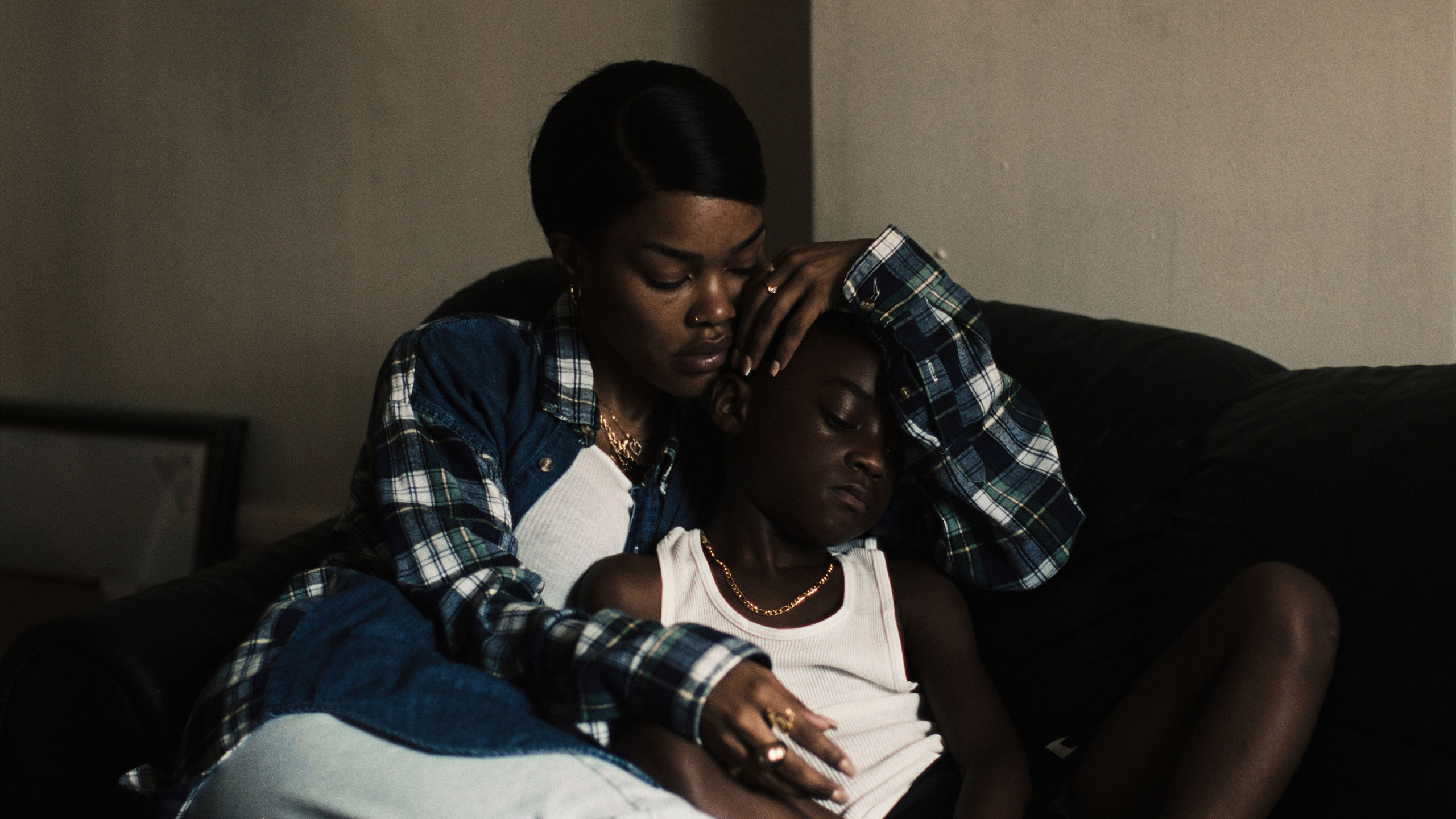In the beginning of A Thousand and One, the New York City streets are alive, detailed and humming with swagger. It’s 1993 and Inez struts through Brooklyn after a five-year stint at Rikers Island, readjusting to the rhythms of freedom. The sun bakes the brownstones, hip-hop echoes around storefronts, and kids suck on ice pops––the kind of weather and atmosphere Samuel L. Jackson might be yammering about from his bedroom window. But there’s no time to waste. Inez is looking for Terry, the seven-year-old she left behind and hopes to reclaim.
To fulfill that desire, Inez makes a dangerous choice: she steals Terry from his foster family and shuttles him to Harlem, where she’ll knock on doors, scrape jobs together, and survive as a mother with him over the next decade. Anchored by a virtuoso performance from Teyana Taylor, director A.V. Rockwell’s ambitious, detailed, slightly underbaked feature debut captures the evolution of this central relationship in the face of New York’s strangling gentrification, parallel subjects tethered by Eric Yue’s lush cinematography and Gary Gunn’s inspiring, R&B-instrumental score. They help clarify the reality that this portrait of desperation is really a panorama.
You can tell Rockwell is pulling from artists like Spike Lee and Barry Jenkins, and the sprucely rendered and edited conversations and circumstances that make up this uncertain life have naturalistic flow. Early on Inez is quick to attack and insult when she feels threatened––perhaps an impulse that covers for her indiscretions in attaining Terry––but as her son (played at 7 by Aaron Kingsley Adetola) eventually grows into an accomplished and academic teenager, you watch her temper and hard edges soften. That change might be attributed to Lucky (William Catlett), the ex-con and live-in boyfriend who eventually marries Inez and commits himself to fathering Terry whenever convenient. He’s coarse but protective, and his arrival accentuates the manufactured nature of this family.
The trials of the early ’90s eventually jump to the early 2000s, but Rockwell’s attention to aesthetic details make those interstitial cards mostly needless. There are the payphones and fashions of the era, sure. But Yue’s almost-menacing drone shots and establishing postcards of family-owned storefronts tell a grander story. When shifting between decades, boulevards lose their hazy, nostalgic glow for more sanitized chain-restaurant and retail signage; in the same way, luxury apartments cast transparent, glass shadows over their old brick and mortar neighbors. On the radio, Rudy Giuliani’s mayoral concerns about jay-walking and redlining pivot into Michael Bloomberg’s concentrated policing efforts, advertising the stop-and-frisk laws that will eventually terrorize Terry’s walks home from school and turn Inez into a more worried, stricter parent.
But Rockwell is just as interested in the things that don’t change, like the dark and scratched apartment walls and spare living room that Terry was forced to inhabit throughout his childhood and that have remained as he develops into a gifted student. Then there’s the outdated kitchenette and busted pipes. In one passage, with the specter of Harlem streets losing property ownership to corporate real estate, Inez’s white landlord insists she leave her apartment for a couple months so his team can repair their antiquated setup. “Don’t you have any family you can stay with?” he asks her, incredulous and likely aware that her only other option is the street. Terry, at this point a 17-year-old played by Josiah Cross, can’t believe his mother doesn’t snap back.
A Thousand and One is most compelling in its last third, when the stakes of Terry’s future come into focus and his adulthood prompts a more dynamic power struggle with Inez. As the glue that holds this sweeping, occasionally underwritten drama together, Taylor rarely falls into the soapy traps that can often plague a story like this. She chews up the fuming stubbornness of Inez’s early hunger and spinning moral compass, turning a profane parent into a weathered, broken version of her former self. There’s still a bite and bitterness in her at the end, a product of her loneliness and loss over the years, but she’s keenly aware that her finish line, like Harlem’s, isn’t far in the distance.
Rockwell has plenty time to develop into a more distinguished storyteller, though her directorial instincts have a staggering specificity. This is a movie that gets gentrification right––she thrives in showing the way brief observations out a window paint a larger picture––and connects little dots from childhood to adulthood, e.g. when Terry briefly gazes at a television program about Quincy Jones as a kid and later tells a high school friend he’d like to compose a soundtrack in the same vein as the legendary artist. It’s a reward for paying attention, and in this bold first step she provides a promising glimpse at the kind of filmmaker she might become.
A Thousand and One premiered at the 2023 Sundance Film Festival.

